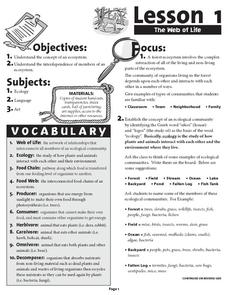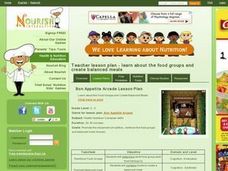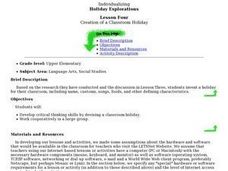Virginia Department of Education
Predator-Prey Simulation
Do your pupils have the misconception that environmental predators are "bad" and harm smaller creatures? The simulation explains, in detail, the important role predators play in maintaining a stable ecosystem. Through web-based research,...
EngageNY
Close Reading and Gathering Evidence from Frightful’s Mountain and “Welcome Back”
Where did the falcons go? Scholars read the article Welcome Back which describes the disappearance of falcons due to the use of pesticides. During a second read, learners annotate the text by marking unfamiliar words and facts about...
Curated OER
Miss America
The first part of this article by PBS on the Miss America pageants can be used in a health class when it's time to talk about body image. There are links to related articles. There are some great questions for discussion. There are ideas...
Curated OER
World of the Pond
Field trip! The class will review what they know about organisms that dwell in freshwater ponds, then trek down to the old water hole to collect specimens for examination. This includes several web links, useful tips, and an excellent...
National Wildlife Federation
Gator Hole Graphics
Climate changes are cyclic so how do these changes impact species that live in different habitats? Learners examine the rainfall levels in a specific swamp habitat. They also review graphical data and tell a story about how the...
Polar Trec
Plankton Parents
Plankton are so abundant in the ocean they outweigh all of the animals in the sea. In this three day activity, groups discuss and become familiar with plankton, capture females, and look for egg production on day three.
NOAA
Build Your Own Ocean Ecosystem
Hold the sea in the palm of your hand! Amateur oceanographers work together to create models of an ocean ecosystem in the sixth and final installment in a series. Raise awareness of global ocean health issues through guided research,...
NOAA
Through Robot Eyes
How do robots assist ocean explorers in collecting data and images? The final installment in a five-part series has science scholars examine underwater images collected by robots and identify the organisms shown. Groups then calculate...
Curated OER
The Web of Life
Students participate in a game in which they discover the balance of life in the ocean. They identify different organisms that rely on different types of food. They answer questions to complete the instructional activity.
Curated OER
Who Ate it First?
Young scholars complete the Seeds of Change worksheet by conducting research on the Seeds of Change website. They list foods native to the Eastern and Western hemispheres, and compile a list of recipes for a meal common after the era of...
Curated OER
Get Out of the Box
Third graders think outside the box with this lesson in organization through webbing. After a lecture/demo, 3rd graders utilize a worksheet imbedded in this plan which guides them through creating a writing web.
Curated OER
A Taste of France: Le Fromage
Students in a French class examine the customs related to eating food. In groups, they use the internet to visit a variety of websites to discover how to properly eat cheese, how it is made and what role it plays in meals. they also...
Curated OER
The Very Hungry Caterpillar
Students explore the concept of good nutrition. For this The Very Hungry Caterpillar lesson, students read the Eric Carle Story and make a nutritious treat with healthy foods.
Curated OER
Bon Appetite Arcade Lesson
Students research nutrition by examining the food pyramid. In this culinary lesson, students identify the concept of a balanced meal by researching the different groups on a food pyramid. Students utilize the web to play a game titled...
Curated OER
You Are What You Eat!
Pupils calculate the calories in food samples and plan a meal based on the calorie amount. For this calories lesson plan, students also devise a work out program to burn off the calories.
Curated OER
People and Space
Students eat dehydrated foods that the astronauts would eat in space. In this dehydrated foods lesson plan, students make lists of food they could eat, discuss how dehydration takes place, eat food, and complete discussion questions.
Curated OER
Life Processes
Students investigate the basic needs of organisms that must be met in order to carry out life processes. They view a variety of organism that are meeting and competing for resources. Students create an Idea Web for the animals shown....
Curated OER
CREATING A CLASSROOM HOLIDAY
Learners invents a holiday for their classroom, including name, customs, songs, foods, and other defining characteristics based on the research they have conducted and the discussion in Lesson Three.
Curated OER
Day Three: Reading menus; writing letters
Students practice English vocabulary in menus and food items. In this ELL lesson, students look at pictures of people eating and describe what they are doing. They talk about the food that they like and dislike and describe why.
Curated OER
Tally Time
Students create a tally chart. In this math and health activity, students discuss healthy foods and create a tally chart showing the number of students who like to eat healthy foods.
Curated OER
Interdependence and Adaptation
Students construct a food web to identify producer, consumer, herbivore, carnivore and predator. They complete an online activity collecting plants and animals and arranging them in the web. They describe the interdependence between...
Curated OER
Termitology
Students engage in an inquiry-based study of the ecology of termites. Through hands-on investigations, they explore the life cycle of termites, the termite's role in the food web, and the unique social structure of termite colonies.
Curated OER
Wacky Wildlife World
Fourth graders research organisms in the environment in Kentucky and create brochures for the local area wildlife reserves. Individuals create brochures that include information on habitat, body characteristics, scientific class, role...
Curated OER
Food Comparison PDF
In this health worksheet, students are led through lessons to become familiar with the dietary recommendations of the government.























